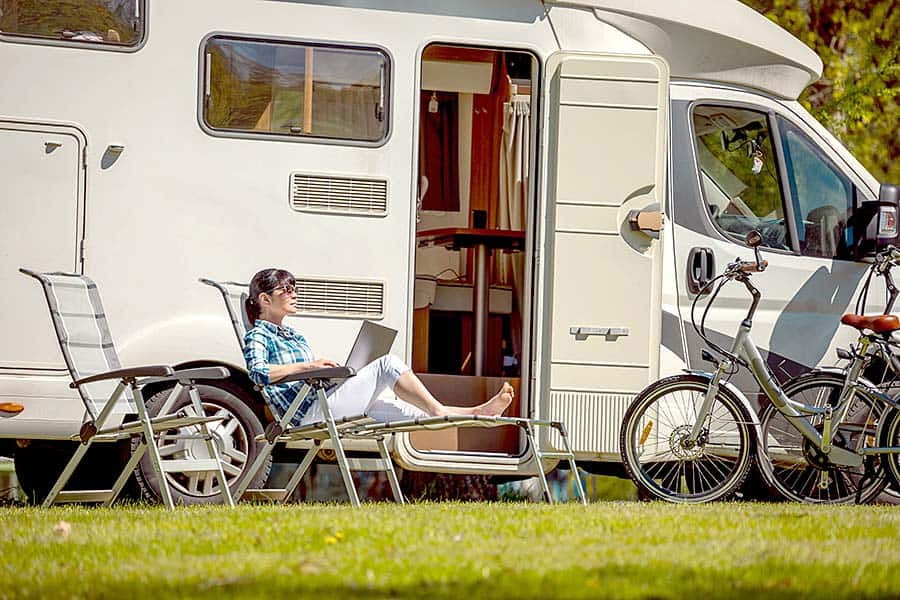
Whether you are traversing the country on a family vacation or setting out on a long-term RV excursion, you will no doubt come across a great many campgrounds in your travels. With information regarding the length of stays at campgrounds relatively scarce when on the road, it’s essential to do all you can to prepare for the stay ahead of time.
At most federal, state, and government-owned campgrounds, you can usually stay up to 14 days, and some may allow up to 21 days in the off-season. Private campgrounds are flexible, offering weekly, monthly, seasonal, or even a year or more extended stays depending on the campground.
However, with variations on length-of-stay ranging anywhere from a typical 14 days to potential year-long ventures, the considerations campgrounds take in deciding on their maximum limit may depend on where they are located and the population of the local area. While busier regions with a large number of tourist hotspots tend to be far stricter on maximum camping limits, the quieter, out-of-reach areas only relatively connected to small towns are far laxer.
If you are getting ready to head out on the road in your RV or camper van, but want to have a better understanding of how campgrounds work for the maximum length of stay, read on!
Campgrounds — How Long Can You Actually Stay?
A more detailed answer of how long you can stay in any given campground depends fundamentally on which campground you choose to stay at.
As you travel around the country and even beyond its borders, you will find campgrounds operated by various groups, individuals, or governing entities. Differences in the organization, the size of the campground, the vicinity to local populations, and the purpose of the campground from a monetary standpoint all serve to determine the lengths of stay available once you arrive.
Government campgrounds located in and around national parks, state parks, national forests, or Bureau of Land Management (BLM) areas often have stringent stay limits to promote equal opportunity for its visitors. Locations like those mentioned above usually have a stay limit of 14 days. Yellowstone, for example, limits the stay to 14 days or less.
However, the campgrounds themselves vary by state and by the organizations responsible for the upkeep. While some might only offer a parking space for your RV, others might provide hook-ups with water and even dump stations.
But government campgrounds are only one of many options when it comes to places to camp.
You might also come across destination venues in your travels, situated near scenic locations and often near heavily trafficked areas. Another option is membership campgrounds that offer long-term stays, flexible options, or rates. You might even find free campsites provided by local communities or organizations, as well as other private or public options scattered across the country like “mom and pop” stops, found as local offerings in most states.
Van Camping Life Tip: When planning on what campground to stay for the night, be aware that some will require a three-night stay on holiday weekends or weekends with special events in the area.
Can You Live Year-Round at a Campground?
While not all campgrounds offer long-term stays, a great many do. Whether for a fee or a work-exchange agreement, there are options available for a more extended stint in your RV
However, a primary consideration when deciding on just where you might be able to live in an RV depends a lot on that location’s weather. For example, if you try to stay in the deep mountainous region of Oregon or farther north, you’ll find that most all campgrounds close down during the winter months.
Though a few campgrounds in the colder climates, usually in more rural areas, will have the option to leave your travel trailer there year-round. In some places, people use their travel trailer as a “camp” where they go on weekends to get out of town to a more remote location. Then they winterize their trailer and leave it there even during the colder months.
But before getting into the fees associated with year-round campground living, it’s good to understand that your best bet of finding a year-round location would be in the sunbelt of the U.S., where weather permits the RV parks and campgrounds to be open through all four seasons.
Some examples of states in the sunbelt, or those along the southern half of the U.S., include:
- Florida
- Georgia
- South Carolina
- Mississippi
- Alabama
- Louisiana
- Texas
- New Mexico
- Southern California
- Southern Nevada
Snowbirds find staying in one location for more extended periods a desirable option to escape from the cold of northern winters.
Other Posts of Interest
- Can Dogs Go Camping: A Complete Guide
- 10 Awesome Van Camping Destinations In The Piney Woods Of Texas
- RVs Built on a Ford Transit Chassis
- How to Keep Things Safe While Camping: The Essential Guide

How Much Does It Cost to Live at A Campground Year-Round?
Just as you’ll find with more short-term stays at campgrounds, the prices vary greatly based on the amenities offered. While some RV parks and campgrounds simply provide a place to park, others might have full hook-ups, dump stations, and even food options.
With that in mind, the campgrounds that work best for you will depend on your budget. For example, there is a high quality-of-life offered from the more well-known camp venues like KOA, but they might have some restrictions on truly long-term stay options depending on how popular that location happens to be.
On the other hand, living in a campground surrounded by a constant stream of travelers coming in and out might not be the ultimate goal of your RV venture. With that in mind, it’s important to gauge the rates of whichever location you choose based on the time of stay and the amenities offered. While there is no cut and dry way to provide the rates of individual places across the country (as they often vary and are subject to change), we will list a few charges you might come to expect for various lengths of stay.
Monthly Rates
Though for overnight stays, campgrounds might charge anywhere from $20-$75 per night, which can total somewhere near $2,000 per month on the high side, there are package offerings to make that amount less. For example, a monthly rate offering at a campground could cut that number to around only $500 to $900 per month. Some campgrounds that offer monthly stays or longer will have metered electricity, so be sure to check out their policy when reserving.
Seasonal Rates
Staying longer than a month at a campground will add up, but there are some seasonal offerings for those looking to stay more long-term. However, depending on how popular the season happens to be, you might expect a surge in price to accommodate the added traffic.
With that in mind, there are often variables in campground pricing, just as there are in the cost of living between states. While you might stay in New Jersey for $1,500 a month through a season, it might only be $900 a month in NC. But if you combine upwards of four seasonal months, it could drop a hundred more dollars.
Yearly Rates
The long-term stays in a campground can often come with the best deals, as the park might count on your monthly contribution as a set income. However, not all campgrounds offer yearly rates.
As mentioned, the more popular the area, the less likely they are to encourage a stay. That said, if you love a place and want to stay, you could expect estimated prices around $1,250 a month for a Florida location, for example, to drop somewhere closer to $750 a month for the yearly option.
Cost-Effective Ideas and Alternatives
While it’s a tough job to get, as there’s not always a large number of vacancies to fill, campground hosting is a gig offered at many parks. It basically entails that you become the on-site resident that helps guests get situated, checked in, and any other responsibilities the park requires. Though it can offer a considerable discount at a campground, even sometimes it may include a free seasonal stay or maybe even a small amount of pay may be included, it’s not an extremely common job to get.
If you would like more information on some opportunities, here is one place to check volunteer.gov.
On the other hand, workamping is a little more common and is an offering of many RV parks and campgrounds as well. While the concept is virtually the same as camp hosting, the job is usually a little less intensive as you aren’t necessarily the “face” of the park but instead another worker within it. However, just like hosting, you can receive amazing discounts for your stay and maybe even a few extra meals tossed in to boot.
Things to Consider with Long-term RV Living
Long-term RV living can be a fantastic adventure, but it isn’t without its trials. That said, the most challenging part of RV living often comes in the planning stages. If you hit the road without a good understanding of campgrounds that you might pass along the way, you might be surprised to find that campsite booked up or simply too far over your budget.
Additionally, no matter where you stay in an RV, you’ll have to account for the necessities you might otherwise not have at your home or apartment. But with an RV, beyond just electricity, water, and food, you also have to know where dumping stations are wherever you go and give your “home-on-wheels” routine maintenance to keep it functioning just as you would a car.
Not to mention, RV life is all about having back-up plans. Should your intended place to camp fall through, or a dumping station is well out of the way, it’s best to be proactive rather than reactive.
Final Thoughts
Saying goodbye to the home you’ve known and taking off in your RV can be a truly fulfilling experience. With campgrounds offering some of the most scenic, unique, and memorable locations for any long-term stays, there’s nothing quite like the freedom that awaits on the road.
However, to ensure you aren’t surprised by the costs of campgrounds, the restrictions of their long-term stays and the amenities they offer once you arrive, planning ahead and doing your research is the only way to be safe, as well as prepared for any situation that arises.





